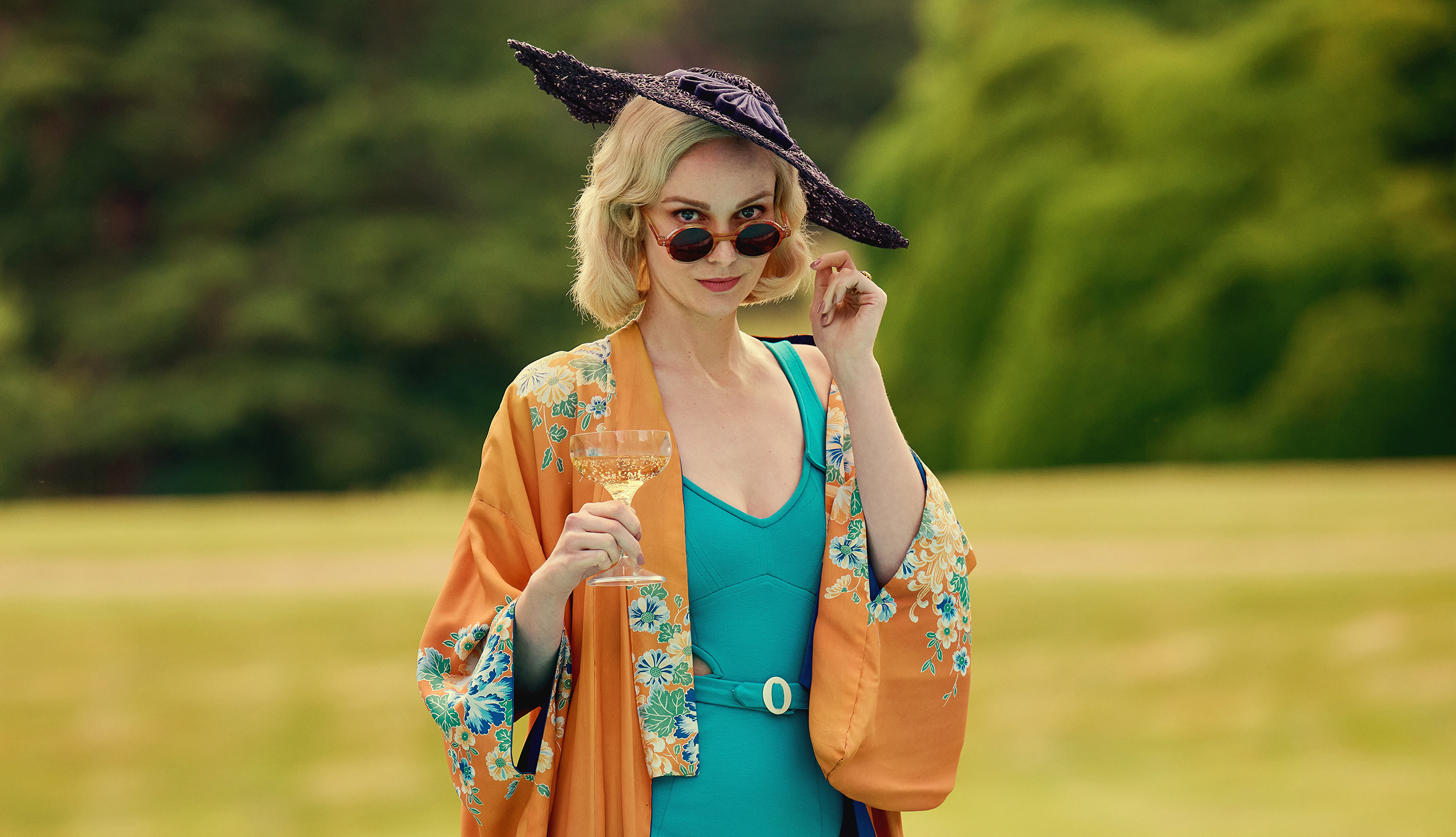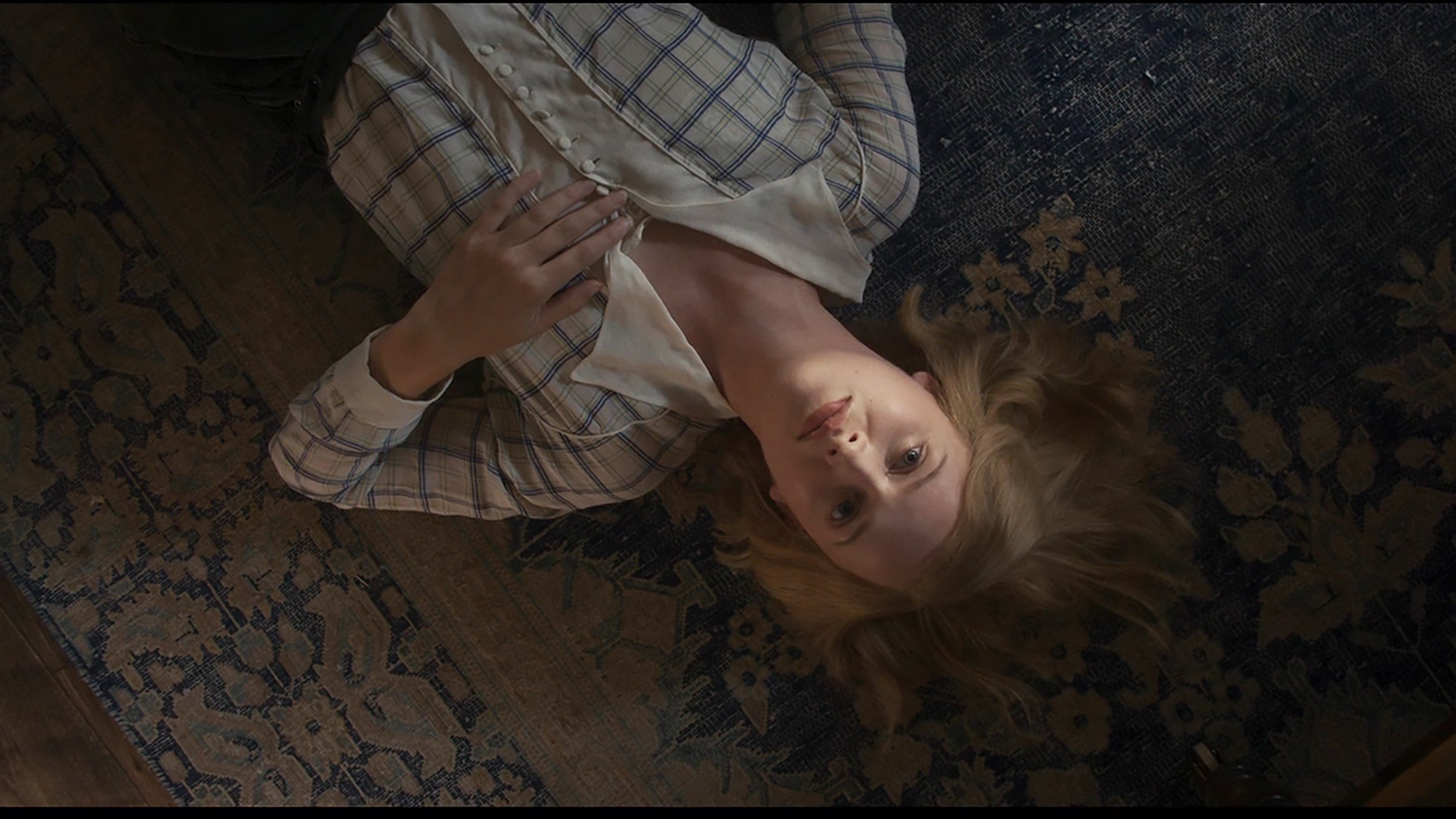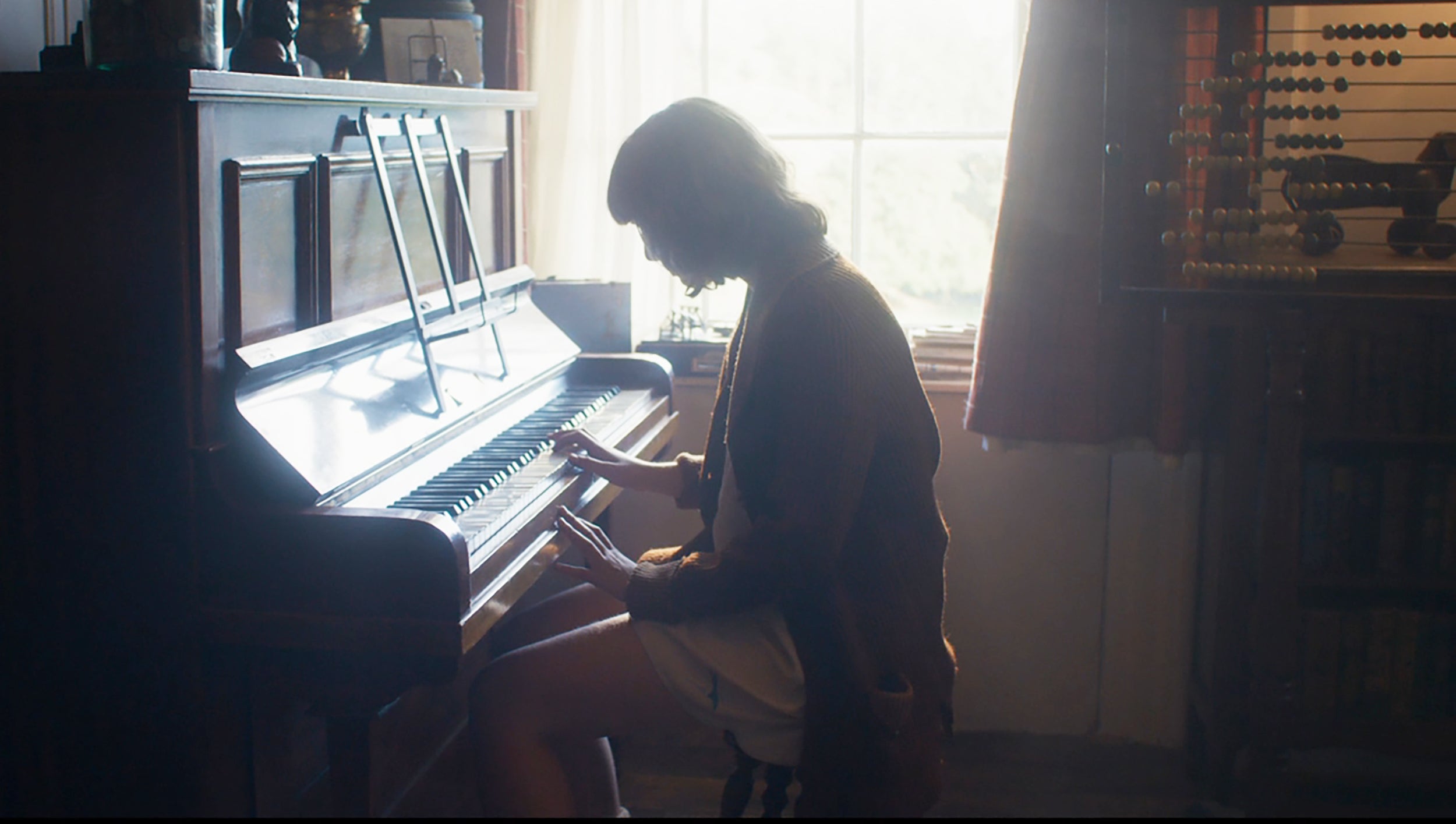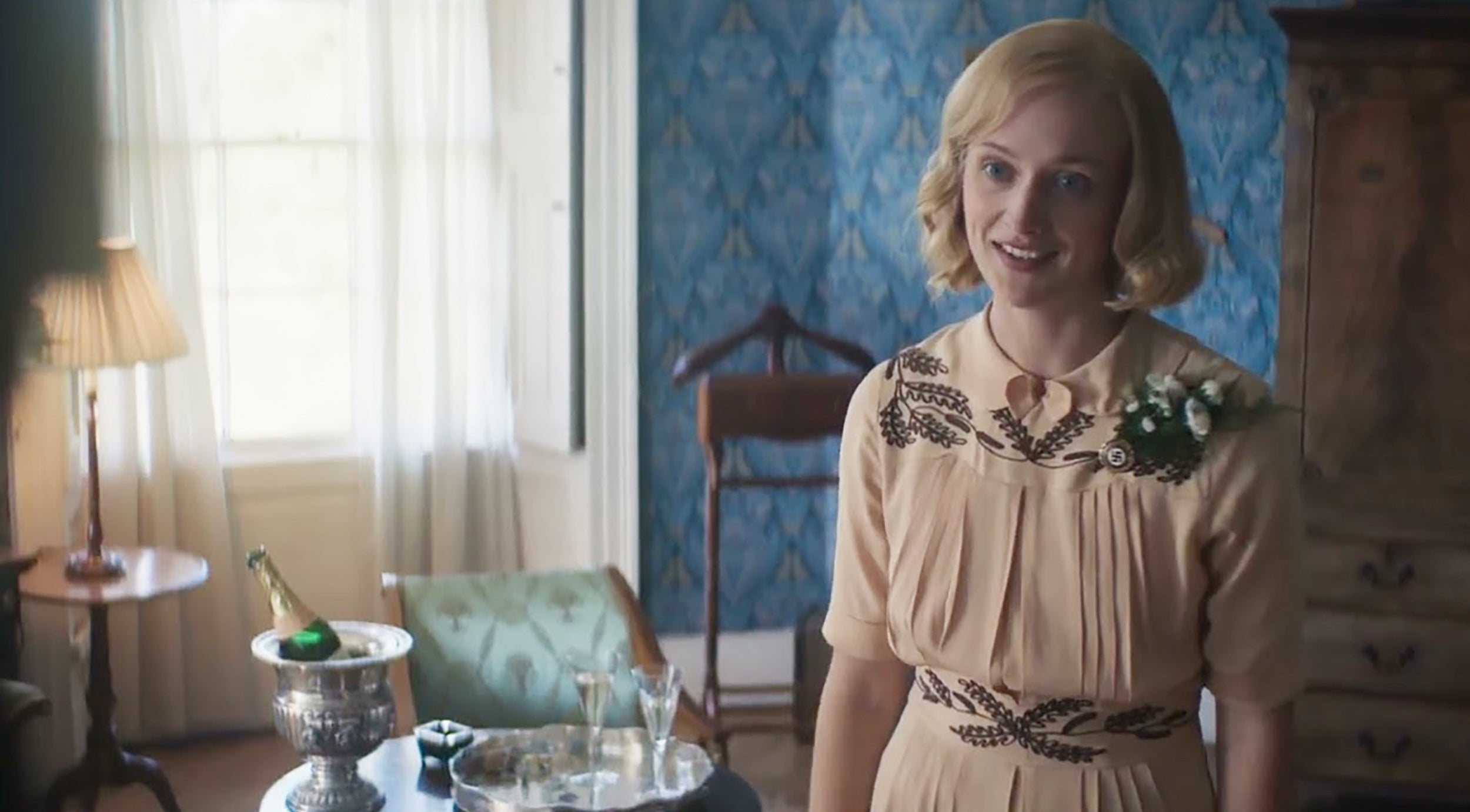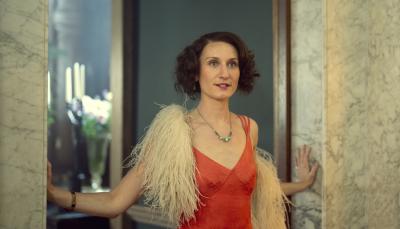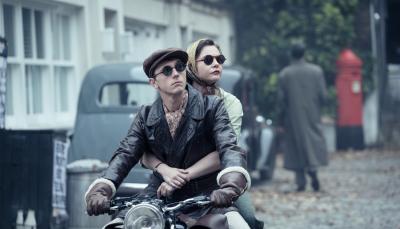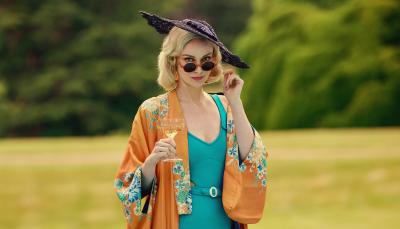The Stars of 'Outrageous' Talk Sisterhood & the Dark Side of Politics
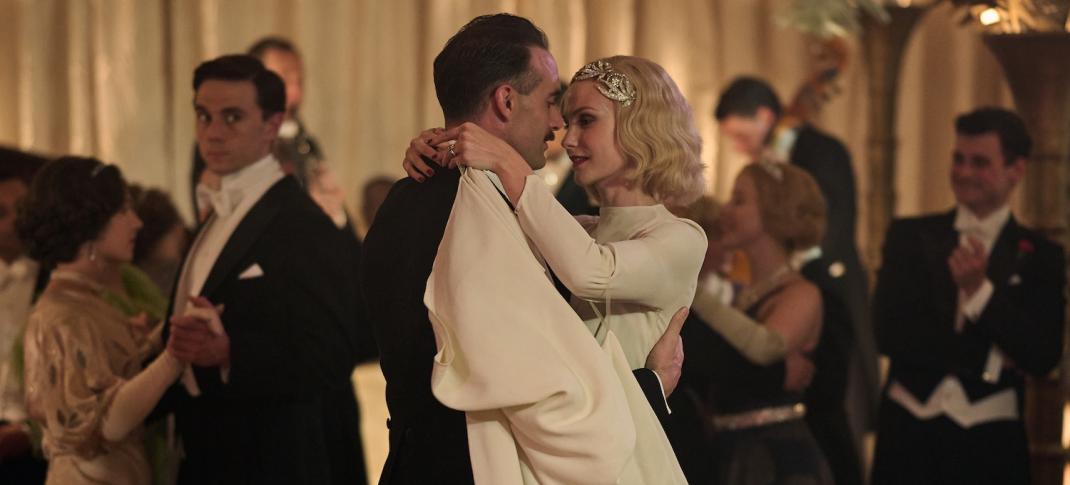
Joanna Vanderham and Joshua Sasse in "Outrageous"
(Photo: BritBox)
The BritBox period drama Outrageous chronicles a particularly thorny time in history by telling the story of a complex and often challenging family. The six Mitford sisters — Diana, Nancy, Pamela, Deborah, Unity, and Jessica — captured the imagination of 1930s Britain thanks to their polarizing politics, dramatic fashion sense, and seemingly never-ending scandals. But these women were more than the easy-to-digest stereotypes that followed them for much of their lives.
These were women who contained multitudes, and perhaps that is never more apparent than when considering the family’s three most controversial members. Diana Mitford was once one of the most hated women in Britain. She married the leader of the British Union of Fascists and was ultimately thrown in Holloway Prison during World War II as a danger to the king’s realm. Her younger sister, Unity, was a known close friend of Adolf Hitler and a virulent antisemite, while Jessica threw herself into Communist causes and essentially ran away from home to fight against the fascists in the Spanish Civil War.
Outrageous doesn’t shy away from the truth of their difficult or even heinous views; however, the series also never forgets that these women are more than their most scandalous deeds, leaning into the complicated relationships between the siblings in ways that often cross political and familial boundaries.
We had the opportunity to sit down with Joanna Vanderham, Shannon Watson, and Zoe Brough, who play Diana, Unity, and Jessica Mitford, respectively, to discuss the complex sibling bonds that bind their characters, the family dynamics of the Mitford clan, the clash of political ideologies, and more.
This interview has been edited and condensed for clarity.
Telly Visions: This is a story about the 1930s that feels shockingly relevant in 2025. When I talked to Sarah [Williams, series writer] about this, she said something that stuck with me about how the heart of the show is the question about whether you can love someone and hate their politics; I think for your three characters in particular, that’s a crucial question.
Joanna Vanderham: It’s fascinating because the primary relationship that breaks down over the series is Diana and Nancy, and that is purely because of Diana’s political views. And it was heartbreaking filming [it]. Bessie is an absolute powerhouse of an actor, so I knew we would have each other’s backs and that we could go there [during those scenes].
But it was particularly heartbreaking for me — Diana was already married by the time we met her in the show, so I didn’t get to do a lot of the big scenes around the table at Christmas. I wasn’t there, and now if we get Season 2, that’s never going to happen. Decca and Diana — they never spoke to each other in later life.
Zoe Brough: She [Jessica] didn’t even go to her funeral! It just goes to show how stubborn they were as people, how incredibly stubborn and strong-willed they were, and how much politics meant to them. Even Decca—I think it says so much that she doesn’t see either of you again—she doesn’t see Diana, she doesn’t see Unity. I think for her, politics was everything. I don’t think she ever fell out of love or stopped loving them. I think she couldn’t look them in the eye anymore.
As for Decca, it seems that she couldn’t forgive Diana, in the way that she seems to have (at least a bit) with Unity; from my personal perspective, I’m like… this, what Unity does is way worse!
Vanderham: I think she blamed Diana, at least partly, for the influence she had on Unity, for introducing her to fascism.
TV: I found the deft way the show handles Diana and Unity fascinating. They’re real people who happen to have appalling, abhorrent views. There could have been an easier, less interesting version where you portray them as monsters, full stop. Joanna, Shannon, how did you find the balance of figuring out how to play these women?
Vanderham: I’m so glad that comes across because that’s what we tried to do. What’s heartbreaking about it all — and what I think Nancy’s perspective is — is that this didn’t need to happen. For Diana, I think she’s just putting one foot in front of the other. She’s made this choice; she’s going to follow this path. As Zoe was saying, they’re all so stubborn. What I think we see in the very first episode is Diana’s charm and her humor. She was incredibly funny and a fantastic mom. But slowly, there’s this armor being built around her.
What I was aiming for is that you get these little peeks throughout the season, these little glimpses, now and then, where she thinks: What have I done? That’s the tragedy of it; she’s too stubborn ever to admit she might have been wrong.
Watson: That’s the genius of Sarah, our writer, as well, trying to portray the complexities of all these women in terms of they’re not just one thing. They’re not just a label: Bad person, fascist. They were humans before that. It was about trying to find the humanity within them. I think a lot of that has to do with the love and affection the sisters have with each other.
TV: The scene between Unity and Jessica when they’re saying goodbye to one another, and Decca sings a song to her as a kind of farewell; the love between them is very palpable, but they can’t get past this ideological difference. How did you, Shannon and Zoe, go about building this genuine, almost tangible care between them despite everything they both stand for?
Brough: That was one of the hardest days — probably the hardest day — on set for me, because it was just so heartbreaking. It took no hard work at all for me to get there emotionally. Sometimes it does, you know, to summon up real emotion, but nothing about this felt false. I think because our relationship [gestures to Shannon] is so close, it felt normal and natural for us.
Vanderham: Your performance scene is so beautiful — both of you guys. When you turn back to the piano and you have this single tear, I mean, it’s a masterpiece.
Watson: I was trying not to bloody cry too, because obviously, seeing someone you feel is like a sister and being upset by it’s quite heartbreaking. We filmed it towards the end of the shoot, so we knew we would be saying goodbye for real soon.
Brough: I also think, for Decca and Unity…they know each other. They know every facet of each other, just right down to the absolute core of who they are. I think that’s part of what’s so affecting — I don’t know, that scene was just a lot to film. It really was.
Watson: Even though they’re on completely opposite sides of the spectrum [ideologically], they still have respect for each other, for how dedicated they are to their causes.
TV: Every Mitford is so different. How much do you think their belief systems are informed by their position in the family and their relationships to one another? Are the younger sisters acting out in some way? Are the older sisters less patient? How does their place as part of this pack influence who they are?
Vanderham: Very much, I think. But the whole show, in and of itself, raises the question of nature versus nurture. Diana wasn’t the oldest, yet she married first and married well. I think that it gave her this sense of superiority over all the other girls. She had the money and she had all the houses, and she was always written about and photographed.
Brough: Sorry to interrupt, but I wanted to add — she was also constantly told how beautiful she was, more than any of the other sisters. Being fed that from an early age, you’re naturally just going to….
Vanderham: It’s the idea that, specifically, Diana is more beautiful than you. That’s a competition. It sets the tone for constant competition and comparison. So I do think that was really, really prevalent in their relationships. You [gestures to Watson] said something really interesting earlier about Unity idolizing Diana.
Watson: There’s a scene in the very first episode where Marv [the sisters’ nickname for their mother] comes into the room and she’s like none of you are smart like Nancy or beautiful like Diana, and our characters take it in stride, are just used to hearing it. But it probably does set a little seed in your stomach, like ‘I’m going to prove you wrong. I’m going to make something of myself in my own way.'
All six episodes of Outrageous are now available to stream on BritBox. The series has not yet been picked up for a second season.

